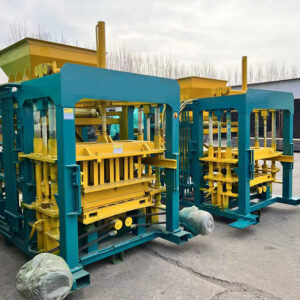
Image source :Aiweiblockmachine
Innovative Automation Revolutionizes Block Brick Making
Introduction
In recent years, the construction industry has undergone a remarkable transformation, fueled by technological advancements that have revolutionized traditional practices. One of the most impactful changes has been the integration of innovative automation technologies into various aspects of construction, including the manufacturing of block bricks. This article explores how innovative automation is reshaping the block brick making process, leading to increased efficiency, quality, and sustainability in construction projects worldwide.
- The Evolution of Brick Making: From Manual Labor to AutomationBrick making has a rich history dating back thousands of years. Traditionally, it was a labor-intensive process, relying on manual labor and simple tools. However, the introduction of automation technologies has ushered in a new era for this age-old industry. Automated brick making machinery has transformed the way bricks are manufactured, offering numerous advantages over traditional methods.
- Automation in Brick Manufacturing: The Key Advantages2.1 Enhanced Efficiency and Speed
Automated block brick making machines have dramatically increased production rates, minimizing human intervention and accelerating the manufacturing process. These machines are capable of producing a large volume of high-quality bricks in a fraction of the time it would take using manual methods.
2.2 Consistency and Quality Control
Automation ensures uniformity and precision in brick production. Machines are programmed to maintain consistent dimensions, density, and texture, resulting in bricks that meet stringent quality standards. This consistency is vital for construction projects that demand precision and stability.
2.3 Labor Savings and Safety
By automating tasks that were previously performed manually, brick making companies can significantly reduce their reliance on human labor. This not only reduces operational costs but also enhances worker safety by minimizing exposure to physically demanding tasks.
2.4 Customization and Innovation
Advanced brick making machinery allows for a greater degree of customization and innovation in brick design. Manufacturers can experiment with various shapes, sizes, and surface textures to meet architects’ and builders’ evolving creative visions.
- Automation Technologies in Brick Manufacturing3.1 Robotic Automation
Robotic arms equipped with advanced sensors and cameras can handle various stages of brick production, from raw material handling to stacking finished bricks. These robots can operate with exceptional precision and adapt to changing production requirements.
3.2 Conveyor Systems and Material Handling Automation
Conveyor systems integrated with sensors and automation controls streamline the movement of raw materials and finished products within the brick manufacturing facility. This reduces manual handling and optimizes material flow.
3.3 Digital Twin and Simulation
Digital twin technology allows manufacturers to create virtual replicas of their brick making processes. This enables real-time monitoring, analysis, and optimization, leading to increased efficiency and reduced downtime.
3.4 Internet of Things (IoT) Connectivity
IoT devices embedded within brick making machinery gather and transmit data related to equipment performance, maintenance needs, and production rates. This data-driven approach enables predictive maintenance and informed decision-making.
- Sustainability and Automation: A Green RevolutionThe integration of automation technologies in brick manufacturing is not only improving efficiency but also contributing to sustainability goals. Automated processes enable precise material utilization, minimizing waste. Additionally, advancements in energy-efficient machinery reduce the environmental footprint of brick production.
- Challenges and Future Prospects5.1 Initial Investment and Training
While automation offers numerous benefits, the initial investment in advanced brick making machinery and training of personnel can be significant. Companies must carefully evaluate the long-term gains against the upfront costs.
5.2 Adaptation and Technological Upgrades
The rapid pace of technological evolution requires brick manufacturers to stay updated with the latest automation advancements and consider periodic upgrades to remain competitive.
5.3 Skill Transition and Workforce Dynamics
As automation replaces certain manual tasks, the workforce dynamics within the brick manufacturing industry may change. Companies will need to ensure a smooth transition for existing employees and provide training for new skill sets.
- Case Studies: Successful Implementation of Automated Brick Making6.1 Germany’s Advanced Brick Manufacturing Facility
A German brick manufacturing company has embraced automation technologies, resulting in a state-of-the-art facility that produces bricks with unparalleled precision and efficiency.
6.2 China’s Mass Production Revolution
China’s construction boom has been fueled by large-scale brick manufacturing operations that utilize advanced automation to meet the demands of rapidly growing infrastructure projects.
- ConclusionThe integration of innovative automation technologies has sparked a revolution in the block brick making industry. By enhancing efficiency, quality, and sustainability, automated processes are reshaping the way bricks are manufactured and used in construction projects worldwide. As automation continues to evolve, brick manufacturers have a unique opportunity to embrace these advancements and contribute to a more efficient and sustainable built environment.
https://youtu.be/BLtJK_hVxDo
